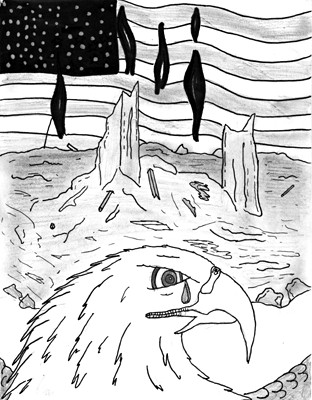All Nonfiction
- Bullying
- Books
- Academic
- Author Interviews
- Celebrity interviews
- College Articles
- College Essays
- Educator of the Year
- Heroes
- Interviews
- Memoir
- Personal Experience
- Sports
- Travel & Culture
All Opinions
- Bullying
- Current Events / Politics
- Discrimination
- Drugs / Alcohol / Smoking
- Entertainment / Celebrities
- Environment
- Love / Relationships
- Movies / Music / TV
- Pop Culture / Trends
- School / College
- Social Issues / Civics
- Spirituality / Religion
- Sports / Hobbies
All Hot Topics
- Bullying
- Community Service
- Environment
- Health
- Letters to the Editor
- Pride & Prejudice
- What Matters
- Back
Summer Guide
- Program Links
- Program Reviews
- Back
College Guide
- College Links
- College Reviews
- College Essays
- College Articles
- Back
A Soldier's Cry
His fingers shook as he scribbled fiercely across the dirty napkin. Around him were the sounds of war; grenades exploding, shouts and yells from the soldiers, strangled cries of pain. He turned to see one of his platoon members hit with a bullet. The man dropped his gun and grabbed at the crimson flower blossoming over his heart. He watched the light leave his friend’s eyes and turned back to the napkin before the man hit the ground. War did that to you. Over the past few months, he had become so desensitized to blood and violence that it barely hurt to see it anymore. Barely.
He had learned after his first mission not to get too close to anyone. One day they’d be there, the next they were laying in a puddle of red crying for their mothers. There was something about seeing grown men cry for their mothers that revealed the intensity and the horrors of the war. This war especially. He hadn’t fought in the First World War for he hadn’t been alive, and after his experiences with the second, he wasn’t sure he was ever going to fight again. If he was lucky enough to get out.
The letter was to his wife and his unborn baby. When he had visited her before he left for the war, she had just found out. She was about five months into her pregnancy. And he was pretty certain he was never going to see either of them ever again. He finished the letter quickly and shoved the napkin into his breast pocket, tossing the pencil aside. He shuddered as a bullet whizzed past his head. He winced as he heard the bullet connect with something solid behind him and the gurgled scream of the man it had hit. He turned to see a fellow soldier from his platoon on the ground, blood flowing from his mouth. He watched as the last puff of air left the man’s lungs; he watched the air twist and turn against the frigid morning sky. Just another soldier that died for his country, he told himself.
He grabbed the gun from the fallen soldier and shot until the bullets ran out. He threw all the grenades he could and shot all the guns he could and did anything and everything to keep from falling apart. One wrong move and he was done.
As he shot and threw he wondered. Did fighting like this make him a man of honor or a man of destruction? No, war was not good. Fighting was not good. But it must be done to solve problems. Then he thought of those being kept and tortured and murdered in the concentration camps. He was fighting for them. For their freedom. If that wasn’t valor, he didn’t know what was.
No, fighting did not make him a true American man. Nor did it make him a man of destruction. He was fighting for a cause; fighting against something that was wrong; something that he firmly believed was evil.
So as he felt the bullet explode into his skin and felt the force of being thrown backwards by the most recent grenade, he decided. He was dying in honor of those he was fighting for. And he’d admit, he screamed for his mother and cried for his wife and his unborn baby. He cried for those so mislead by the evil deeds they were committing; he cried for those who had cried, were crying, and would cry. He cried for the pain that this war caused the families of the soldiers. He cried for the men he had killed and he cried for forgiveness.
With his last strength, he pulled the rumpled napkin out of his pocket and clutched it in his hand. It told his wife how much he loved her. How much he loved the baby and who he or she would grow to be. And he told her not to cry for him. Because that was one other thing he did as well. He had cried for himself.

Similar Articles
JOIN THE DISCUSSION
This article has 2 comments.
